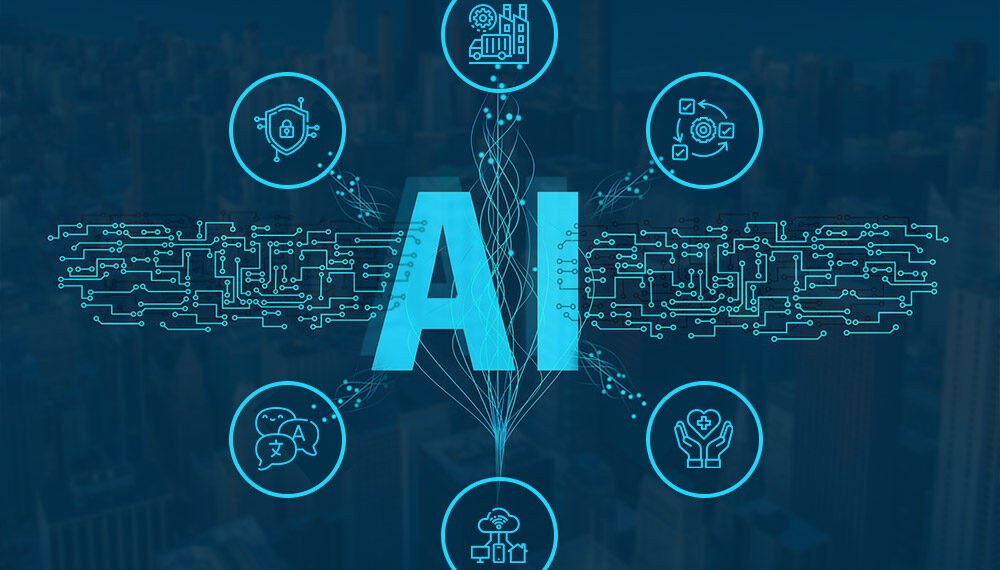Innovations in artificial intelligence are transforming industries and reshaping how society operates. AI has become pivotal in driving advancements in fields such as big data, robotics, and the Internet of Things. Generative AI, in particular, has widened the scope of what these technologies can achieve, making them more prominent and accessible.

A significant number of businesses have already embraced AI, while others are actively exploring it. Recent surveys indicate that nearly four out of ten organizations have adopted generative AI into their workflows, with many more considering its potential. As AI evolves, its influence is expected to grow, creating both opportunities and challenges across various sectors.
Key Takeaways
- AI is driving innovation in multiple industries.
- Generative AI is gaining widespread adoption in business workflows.
- The rapid evolution of AI presents both opportunities and risks.
The Progress and Growth of AI
Artificial Intelligence has transformed significantly since its early beginnings in the 1950s. One milestone was Christopher Strachey’s checkers program running successfully on the Ferranti Mark I, marking one of the earliest demonstrations of AI. Over time, advancements like IBM’s Deep Blue, which triumphed over chess champion Garry Kasparov in 1997, showcased the expanding capabilities of machine learning algorithms. Further successes, including IBM Watson’s Jeopardy! victory in 2011, highlighted developments in human-computer interaction and reasoning.
The emergence of generative AI has defined recent years in AI innovation. OpenAI’s release of GPT models in 2018 laid the foundation for breakthroughs such as ChatGPT and GPT-4, which can generate content including text, audio, and images using vast training data and neural networks. Companies like Anthropic with Claude, Google with Gemini, and DeepSeek with its R-series models are introducing their own large language models, competing on efficiency and operational costs.
AI’s practical applications extend beyond content generation. Technologies leveraging machine learning, such as RNA sequencing and speech recognition, emphasize intelligence rooted in perception and reasoning. Recommendation systems and applications in natural language processing further demonstrate AI’s role in analyzing and interpreting complex data, advancing human-computer interactions. Continued evolution reflects the balance between innovation and efficiency in its algorithms and learning methods.
How AI Will Shape the Coming Years
Enhanced Organizational Efficiency Through Automation
Artificial intelligence is playing a growing role in improving workplace efficiency. Many organizations now use AI tools such as chatbots and virtual assistants to manage routine tasks. These tools help businesses answer common customer questions and provide employees with quick solutions to internal inquiries. Automating these repetitive interactions allows employees to focus more on strategic and higher-value tasks.
AI also improves planning and decision-making by analyzing large datasets and delivering insights in a visual format. This enables leaders to make informed choices more quickly, saving time and resources. As AI capabilities expand, businesses are expected to further invest in such tools to increase productivity and streamline operations.

| Benefits of Business Automation with AI | Examples |
|---|---|
| Faster decision-making processes | Data visualization |
| Automation of repetitive customer interactions | Chatbots, digital assistants |
| Increased focus on high-priority responsibilities | Strategic planning |
Investments in AI innovation will likely continue to shape how organizations handle operations, ultimately boosting efficiency and enhancing output across industries.
Workforce Transformation and Challenges
The rise of AI automation has raised concerns about job displacement in certain sectors. Many tasks, especially those involving manual or repetitive work, are at risk of being performed by machines. For instance, roles such as administrative positions are more vulnerable to automation. However, this shift also highlights growing demand for jobs in emerging fields like machine learning and cybersecurity.
For skilled workers, AI often acts as an enhancement tool. It supports complex problem-solving or creative work rather than replacing these roles entirely. As businesses adopt AI, there will be a greater emphasis on upskilling employees to tackle evolving responsibilities. Training programs aimed at equipping workers with the technical and digital skills needed to thrive alongside AI are becoming a priority for companies.

AI and Job Market Impacts
- Potential Job Loss Areas: Administrative roles, repetitive manual jobs
- Growth in High-Skill Jobs: Machine learning experts, information security analysts
- Focus on Upskilling: Retraining efforts for employees to adapt to AI tools
While automation improves productivity, society must plan how to balance job displacement with opportunities to ensure workforce sustainability.
Ethical Concerns Surrounding Data Privacy
The development of AI heavily relies on extensive datasets, sparking debates about the ethical use of personal information. Companies use this data to train AI models but risk infringing on consumer privacy. Concerns about improper data collection have led to increased regulatory scrutiny and calls for transparency in how organizations handle sensitive information.
Governments, such as the administration in the United States, have outlined principles prioritizing data privacy and responsible AI practices. Although these measures aim to encourage accountability, achieving the right balance between innovation and security remains a challenge. As AI evolves, businesses may need to adopt stricter policies to ensure compliance while addressing public concerns about privacy.
Key Data Privacy Issues in AI Development
- Companies collect large volumes of user data, raising ethical challenges.
- Poor transparency about how data is used can lead to mistrust or legal issues.
- Governments are introducing guidelines to promote responsible data practices.
Data privacy is a crucial aspect of AI’s future, with decisions in this area shaping both technology adoption and societal trust.
Which Sectors Are Most Transformed by AI?
Transforming the Manufacturing Sector
AI has brought significant advancements to the manufacturing industry, particularly through robotics and predictive systems. Intelligent robots work alongside humans to handle tasks like assembling and stacking materials. Predictive tools powered by AI help improve equipment maintenance, ensuring smoother operations and reducing unplanned downtime.
Shaping Modern Healthcare
AI is revolutionizing healthcare by improving diagnostic accuracy, expediting drug development, and offering automated patient monitoring. Tools like virtual assistants in healthcare help track patient health, while AI’s ability to interpret vast medical datasets assists doctors in identifying diseases earlier and more effectively.
Evolving Financial Services
In the financial world, AI is employed to detect fraudulent transactions, facilitate audits, and assess loan eligibility. Machine learning plays a critical role in examining vast datasets to assess market risks, enabling financial professionals to make quicker, more informed decisions when trading and investing.
Enhancing Learning Experiences

Education is undergoing transformation as AI tailors learning to the unique needs of students. Tools powered by AI digitize textbooks, identify plagiarism, and even use facial recognition to gauge emotions. This allows educators to understand when students are struggling or disengaged and adjust teaching methods accordingly.
Impacting the Media Industry
AI is influencing media creation and content generation. Systems like automated writing tools generate data-based reports, contributing to faster news production. However, the increasing presence of generative tools in journalism has sparked debates about authenticity and human oversight in reporting.
Improving Customer Interactions
AI-driven chatbots and virtual assistants are enhancing customer service by providing immediate and efficient responses to queries. These tools not only analyze customer data to improve interactions but also create more personalized experiences for both service providers and their customers.
Transforming Transportation and Mobility
AI is driving changes in transportation, with autonomous vehicles leading the way. While fully self-driving cars are still improving, AI-powered systems are already enhancing navigation and planning trips. These developments point to a future where AI makes transportation safer and more efficient.
Potential Challenges and Risks of AI
Job Displacement
The growing reliance on artificial intelligence has the potential to disrupt employment across various industries. Many jobs, particularly those involving routine tasks, could be automated, leaving individuals without work. Certain demographics, including women, may face higher risks as automation intersects with existing inequalities in skill gaps. Without efforts to reskill or upskill workers, this trend might increase unemployment rates and reduce opportunities, especially for underrepresented groups striving to enter tech-driven fields.
Algorithmic Bias
AI systems often mirror the biases present in the data used to train them. For instance, facial recognition tools have demonstrated higher accuracy in identifying lighter-skinned individuals while frequently misidentifying darker-skinned individuals. These biases can reinforce systemic discrimination when left unchecked. If ethical considerations are not prioritized in the development of AI, such issues may continue to amplify societal inequalities.
Misinformation and Manipulated Media
The creation and distribution of altered content, such as deepfake videos, represent a significant concern tied to AI’s advancements. These sophisticated manipulations make it increasingly difficult to distinguish real content from fake content. This can erode public trust, spread false information, and even facilitate harmful activities such as fraud or political propaganda. The rapid dissemination of such misleading material has the potential to harm individuals or destabilize institutions on a larger scale.

Privacy and Data Security Concerns
AI systems rely heavily on large datasets, often including sensitive personal information. The use of non-public company data in generative AI tools raises alarm, with businesses expressing apprehension over potential breaches. A single security incident could compromise the data of millions, causing legal and financial repercussions. Organizations must implement strict guidelines to safeguard user information and address vulnerabilities stemming from data misuse.
Autonomous Weaponry
The integration of AI in weapon systems introduces critical ethical and security challenges. Smart weapons may fail to distinguish between civilian and military targets, increasing the risk of unnecessary harm. Furthermore, the misuse of such technologies by unauthorized individuals or nations could lead to devastating consequences. Discussions around regulation and oversight remain crucial to prevent potential disasters tied to autonomous systems.
Advanced and Independent Intelligence
The idea of machines surpassing human intelligence is often seen as a worst-case scenario. While the concept of machines overtaking human existence is speculative, the increasing complexity of AI systems poses transparency challenges. Developers may not always fully understand how certain decisions are made, complicating efforts to address errors or unpredictable behavior. Enhanced focus on accountability and oversight is essential to prevent unintended negative outcomes.
Frequently Asked Questions
Predictions for How AI Could Be Part of Everyday Life by 2025
Artificial intelligence is likely to become more integrated into daily activities across different settings. Smart home devices, such as assistants and appliances, may handle tasks with increased efficiency. Healthcare could see enhanced diagnostic tools powered by AI, while industries like retail might rely on more personalized recommendations for customers.
How AI May Influence Human Interaction with Technology
The development of artificial intelligence could shape how humans interact with devices. People might rely more on AI-driven systems for decision-making, creating a closer dependency on automated solutions. As systems become more intuitive, users may feel more comfortable engaging with technology in areas like communication, transportation, and entertainment.
Expert Perspectives on AI’s Long-Term Societal Effects
Experts often point to potential benefits, including improved productivity and innovation in critical areas like science and medicine. However, discussions also highlight concerns about privacy, ethics, and the potential displacement of jobs. Ethical considerations regarding how AI is designed and deployed will likely shape societal outcomes in the future.
Industries Most Likely to Experience AI-Driven Transformations
Several sectors are expected to undergo major changes due to advancements in AI. Healthcare could benefit from faster and more accurate diagnostics. Manufacturing may increasingly rely on automation to improve supply chain efficiency. Additionally, industries like finance and education are predicted to leverage AI for better risk analysis and personalized learning experiences.






































Comments 1